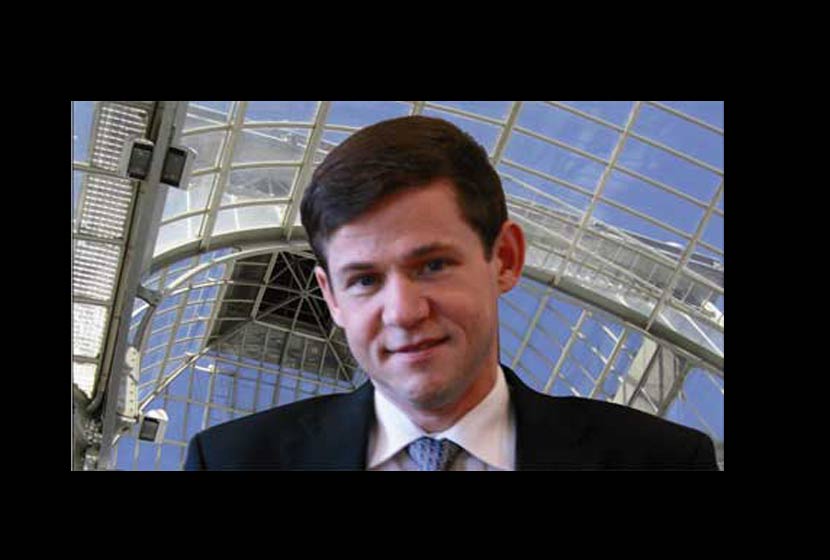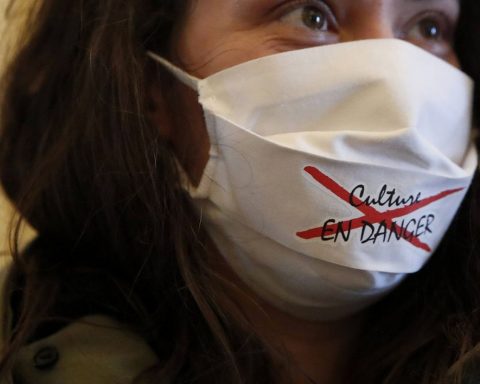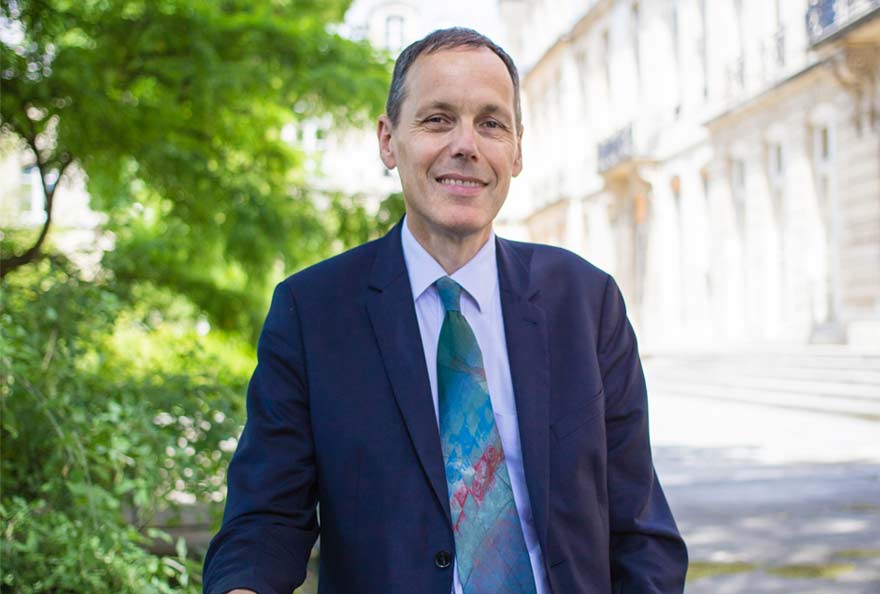Moscow Innovation 2013 : The Russian Federation is working with discreet strategic determination to build new sustainable economic ties with France. Innovation is at the heart of this economic policy, and our country, France, is invited to present its best innovations in Moscow in November 2013.
 I have just met the representative of the Ministry of Science and Education, Counsellor for Science and Technology at the Embassy of the Russian Federation. Doctor of Economics, Kirill BYKOV receives me for a presentation of the Russian system of financing innovation and the current developments of French and Russian co-financing of innovation projects.
I have just met the representative of the Ministry of Science and Education, Counsellor for Science and Technology at the Embassy of the Russian Federation. Doctor of Economics, Kirill BYKOV receives me for a presentation of the Russian system of financing innovation and the current developments of French and Russian co-financing of innovation projects.
During our interview, Kirill BYKOV revealed to me that he is also a graduate of HEC. I immediately remember that as soon as the Berlin Wall fell, François Mitterrand decided to open HEC to students from Russia at the beginning of the 1990 academic year, in order to train the first Russian leaders in our economy. I remember my interview at the time, in the summer of 1990, with the HEC selector who had just returned from Poland and Russia: he was disappointed by the Polish selection which did not reach the level of the French selection, but dazzled by the level of excellence of the Russian selection. He was confident and certain that the new Russian economic generation would brilliantly meet all the challenges that lay ahead. Does Mr Kirill BYKOV know that he is a pure product of François Mitterrand's policy?
![]() Can you give us an introduction to the first economic benchmarks on innovation financing in Russia?
Can you give us an introduction to the first economic benchmarks on innovation financing in Russia?
Kirill BYKOV : In Russia, the system inherited from the Soviet model, i.e. sovereign State resources, provides financing for innovation, almost entirely for phase 1 of research and innovative design up to the technological demonstrator, i.e. up to the innovation marketing phase.
In 2010, more than 60% of Russian state agencies financed innovation, 20TP1T of development institutes, and 3% of financial enterprises.
At present, innovation policy is to develop the financing of innovation by financial enterprises. Because spending on innovation is increasing. Russia's overall R&D expenditure is 12.5 billion euros. Russia remains in the world's top ten, at a rate of 1.25 % of its GDP.
 The University of Russia has received €1 billion in funding for innovative research for the period 2010-2012.
The University of Russia has received €1 billion in funding for innovative research for the period 2010-2012.
From 1987 to 2002, innovations were concentrated in the field of energy, gas in particular. From 2002, Techno - Programmes began, this time not concentrated on a single field but polytechnic with poles of excellence such as waves, biopharmacy, ICT, electronics and aeronautics.
From 2009, because of the crisis, innovation fell to 1.04 % of GDP because innovation policy is turning towards business: how to increase the profit created by an innovation?
From 1995 to 2010, "innovative production" increased in volume by 34 %. In absolute volume, more must be spent to maintain the increase in "innovative production" - one rouble spent generates 2.4 roubles of innovative production in 2010 compared to 5.5 roubles in 1995.
![]() What do you call innovative production?
What do you call innovative production?
KB Innovative Production" is a concept used and calculated by the Statistical Service. Normally, it is production created as a result of innovations.
Russian companies' spending on innovation totals 1.04 billion. The rate of R&D spending by companies is 17%, and purchases of innovative products and equipment created by others account for 51 % of spending.
![]() Could you specify these innovative products and equipment invested?
Could you specify these innovative products and equipment invested?
KB : In fact, this is just an illustration of the situation that companies prefer to buy innovative equipment rather than invest in their creation by its capacities.
In Russia, it is also the State which finances the Development Institutes:
1 - FASIE, Support Fund for Small Businesses
2 - The Russian Fund for Technological Development
3 - ROSNANO
4 - Russian Venture Company
5 - The SKOLKOVO Fund
6 - The State Company VNESHECONOMBANK
Universities are mostly state-funded.
![]() During the UBI France-Russia meetings last December, the Regions of Russia were in the spotlight. What is the new regional policy for financing innovation?
During the UBI France-Russia meetings last December, the Regions of Russia were in the spotlight. What is the new regional policy for financing innovation?
KB The new innovation financing policy is moving towards a regionalisation of innovation financing. Develop regional mechanisms for subsidies, equipment and interest compensation for loans.
A nursery costs 5 million euros and the creation of a Technopark 25 million euros.
![]() Could you specify whether it is the overall cost of an accommodation or a park, or the State-Region co-financing?
Could you specify whether it is the overall cost of an accommodation or a park, or the State-Region co-financing?
KB These figures represent the contribution of the State, i.e. the federal budget, in the creation of a park and its supply of the necessary equipment. Normally, this is almost all of the park's needs in the initial phase.
From 2012, a programme of 25 regional clusters supported by the Russian Federal State in cooperation with the Association of Innovative Russian Regions is being developed. The principle is to concentrate innovative companies in specialised clusters under the umbrella of a large parent company.
The regional services closest to the final client, the innovative creator, distribute the aids and subsidies.
![]() Could you show us a recent implantation?
Could you show us a recent implantation?
 KB In Russia, startups are called Gazelles. The last accommodation for Russian startups was set up in Krasnoyarsk in Siberia: eighty-three gazelles.
KB In Russia, startups are called Gazelles. The last accommodation for Russian startups was set up in Krasnoyarsk in Siberia: eighty-three gazelles.
The Krasnoyarsk nursery chose a spring swallow in the colors of the eco - design sky blue and spring green as its image.
![]() If taxation is low in Russia, then is there any tax-free financing?
If taxation is low in Russia, then is there any tax-free financing?
KB No taxation, therefore no tax exemption through innovation. In Russia, the personal tax is 13 % and corporate taxes are 20%. More precisely, the profit tax is 20% since 2009, and with other business taxes remains in the range 27-33% according to different approaches of calculation. Therefore, there is no incentive to tax exemption in Russia. The Russian Business Angel invests in the spirit of growth.
![]() And is there a spirit of citizenship?
And is there a spirit of citizenship?
KB Unquestionably. The minimum budget for professional Russian Business Angels is €50,000 compared to €10,000 in France.
![]() Who are the Russian Business Angels, what types and some known names?
Who are the Russian Business Angels, what types and some known names?
KB : Predominantly non-residents, active in several sectors of the economy. Their typology:
- Private investors are employees with a high income, for the envelope 20 - 50 000 €.
- Professional investors are often brought together in associations or unions, with a budget of €50-150,000.
- The "elephant" investor is a wealthy private entrepreneur, with a budget of €150-500,000.
There are names, you can find them on the internet, but they won't tell your readers anything...
![]() So in Russia, the selection is not made on the obstacle course of financing innovation as in France. So how is the selection process carried out?
So in Russia, the selection is not made on the obstacle course of financing innovation as in France. So how is the selection process carried out?
KB : There are two events at the start:
- the selection on innovation value by development institutes and the initial difficulty in finding the right place to locate.
- The second test is to be ready to cover the financing by oneself up to 50 %: pledge a good or get a loan.
![]() In other words, the project leader is well supported, but in exchange the risk is shared 50/50?
In other words, the project leader is well supported, but in exchange the risk is shared 50/50?
 KB Yes, it is proof of the project leader's faith in its vitality. To support this vitality, in July 2009 the Moscow Stock Exchange created a special sector called "The Innovation Market" with a market capitalization of 960 million euros and a turnover of 10 million euros per month. This market is an instrument of entrepreneurial development. The Moscow Stock Exchange is one of the top 20 platforms for selling shares of innovative companies.
KB Yes, it is proof of the project leader's faith in its vitality. To support this vitality, in July 2009 the Moscow Stock Exchange created a special sector called "The Innovation Market" with a market capitalization of 960 million euros and a turnover of 10 million euros per month. This market is an instrument of entrepreneurial development. The Moscow Stock Exchange is one of the top 20 platforms for selling shares of innovative companies.
![]() How do France and Russia cooperate in innovation? Is there any Franco-Russian co-financing?
How do France and Russia cooperate in innovation? Is there any Franco-Russian co-financing?
 KB The Franco-Russian co-financing is being designed within the Working Group on Innovations of the CEFIC Bilateral Economic Council. In October 2012 in Paris, a meeting took place bringing together interested ministries, OSEO, ANR, the Franco-Russian Energy Efficiency Centre and Russian and French clusters. In December 2012, this topic was discussed during the technological workshop of the 4th Franco-Russian Meeting of Decentralized Cooperation which took place in Nice.
KB The Franco-Russian co-financing is being designed within the Working Group on Innovations of the CEFIC Bilateral Economic Council. In October 2012 in Paris, a meeting took place bringing together interested ministries, OSEO, ANR, the Franco-Russian Energy Efficiency Centre and Russian and French clusters. In December 2012, this topic was discussed during the technological workshop of the 4th Franco-Russian Meeting of Decentralized Cooperation which took place in Nice.
The idea is to develop pilot projects to demonstrate and verify that it works.
![]() How can the two systems be harmonized? What are the problems on the French and Russian sides? AFIC? Russian Joint Ventures?
How can the two systems be harmonized? What are the problems on the French and Russian sides? AFIC? Russian Joint Ventures?
KB I don't think our idea is to harmonize the two systems. In fact, yes, there are points that we need to adjust. For example, the length of time it takes to review files in both countries. But what is much more important is to find the financial capacity to fund the best projects, as well as to select projects that are of interest to both parties in view of their future opportunities.
![]() How are the links between OSEO and the Russian Support Funds developing?
How are the links between OSEO and the Russian Support Funds developing?
KB The links are created for example when signing an agreement between OSEO and the VEB in June 2011 at the Joint Scientific Funding Agreement between the Russian Ministry of Science and the ANR.
![]() Would you like to announce a particular Russian innovation event?
Would you like to announce a particular Russian innovation event?
KB In 2012, we organized an international innovation forum in Moscow. At the first forum, 1,000 innovations were present from 16 countries. Russia would like to encourage French startups to participate in the Second Moscow Innovation Forum, which will take place from October 29 to November 1, 2013. Russia would like the broadest French participation at a very high level of innovation.
![]() What incentives for French startups?
What incentives for French startups?
 KB If it is the Forum it will depend on the level of official participation of your country, but obviously there will be many possibilities. We are interested in attracting as many start-ups as possible.
KB If it is the Forum it will depend on the level of official participation of your country, but obviously there will be many possibilities. We are interested in attracting as many start-ups as possible.
Thank you for your welcome to the Embassy of the Russian Federation.

Top Ten Gazelles Russians are eleven as the three musketeers were four, like a sports team:
|
I.T.GROUP |
ICT |
|
|
UNICHIMTECH |
New materials |
|
|
Center of Financial Technologies (CFT) |
Finance |
|
|
DIAKONT |
Security and energy efficiency |
|
|
INTERSKOL |
Mechanics |
|
|
NEARMEDIC |
Pharmaceuticals, biotechnologies |
|
|
NOVOMET |
Industrial equipment |
|
|
CHARP-VC |
ICT |
|
|
SWEMEL |
ICT |
|
|
ELECTRONIC ARCHIVE CORPORATION |
ICT |
|
|
ER-Telecom |
ICT |
Beatrice of Damascus for UP' Magazine {Jacuzzi on}












